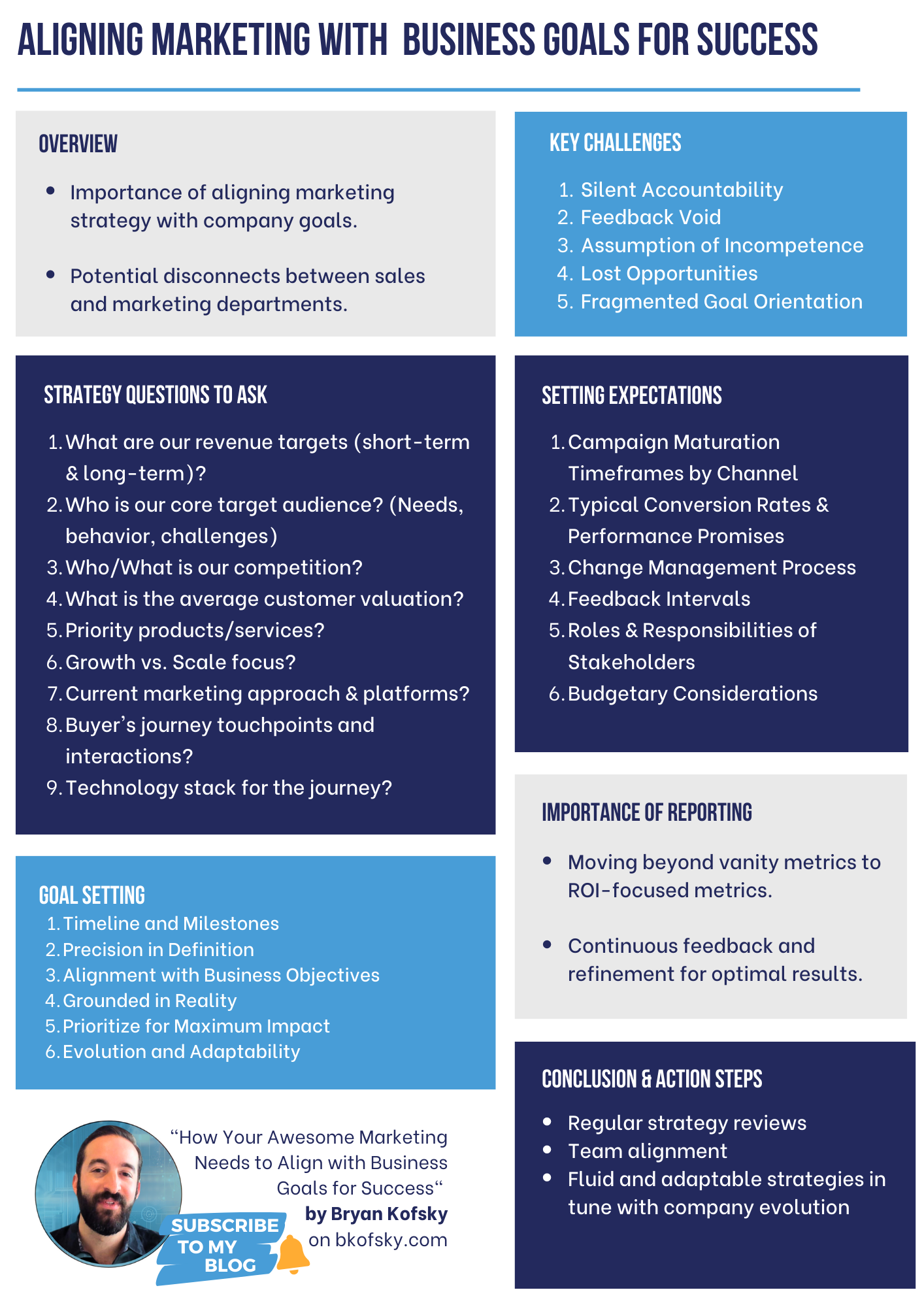Navigating Towards Success: Aligning Marketing Strategies
In today’s fast-paced and competitive business environment, it is more important than ever for companies to align their marketing strategies with their overall business goals. By doing so, businesses can ensure that their marketing efforts are not only effective but also contribute to the success of the organization as a whole.
One of the key ways to align marketing strategies with business goals is to clearly define and communicate the objectives of the marketing team. This means setting specific, measurable, achievable, relevant, and time-bound (SMART) goals that are in line with the overall objectives of the company. By having a clear understanding of what the marketing team is working towards, everyone can be on the same page and work towards a common goal.
Another important aspect of aligning marketing strategies with business goals is to regularly track and measure the performance of marketing campaigns. By analyzing key performance indicators (KPIs) such as website traffic, lead generation, conversion rates, and return on investment (ROI), businesses can determine which strategies are working and which ones need to be adjusted. This data-driven approach allows companies to make informed decisions about their marketing efforts and ensure that they are on track to meet their business goals.
In addition to tracking performance metrics, it is also important for businesses to stay up-to-date on the latest trends and technologies in the marketing industry. By staying informed about new tools, strategies, and tactics, companies can adapt their marketing efforts to stay ahead of the competition and reach their target audience more effectively. This proactive approach to marketing ensures that businesses are constantly evolving and improving their strategies to align with their business goals.

Image Source: bkofsky.com
Collaboration and communication are also essential components of aligning marketing strategies with business goals. By fostering a culture of collaboration between the marketing team and other departments within the organization, businesses can ensure that everyone is working towards the same objectives. This cross-functional approach allows for greater synergy between different departments and ensures that everyone is aligned in their efforts to achieve the company’s overall goals.
Furthermore, it is important for businesses to continuously evaluate and adjust their marketing strategies as needed. In today’s rapidly changing business landscape, what works today may not work tomorrow. By regularly reviewing and updating their marketing strategies, companies can stay agile and responsive to changes in the market, ensuring that they are always aligned with their business goals.
Overall, aligning marketing strategies with business goals is crucial for the success of any organization. By setting clear objectives, tracking performance metrics, staying informed about industry trends, fostering collaboration, and adapting strategies as needed, businesses can ensure that their marketing efforts are not only effective but also contribute to the overall success of the company. By mapping out a clear path towards success and navigating towards it with a strategic and data-driven approach, businesses can achieve their goals and thrive in today’s competitive business landscape.
Charting a Course to Achieve Business Goals
In the fast-paced world of marketing, it is essential for businesses to align their strategies with their overall goals. By charting a course to achieve business goals, companies can ensure that their marketing efforts are not only effective but also directly contribute to the success of the organization as a whole.
One of the key aspects of mapping success is identifying and understanding the specific business goals that need to be achieved. These goals can vary from increasing sales and revenue to expanding market share or improving customer satisfaction. Once these goals are clearly defined, businesses can then develop marketing strategies that are specifically tailored to help achieve them.
For example, if a company’s goal is to increase sales by 20% in the next quarter, their marketing strategies may focus on launching a new product, running promotions or discounts, or targeting a new market segment. By aligning these marketing tactics with the overall goal of increasing sales, the company can create a cohesive and targeted approach that is more likely to be successful.
Another important aspect of mapping success is ensuring that all stakeholders are on the same page when it comes to business goals and marketing strategies. This includes not only the marketing team but also other departments within the organization, such as sales, finance, and operations. By fostering open communication and collaboration between different teams, businesses can ensure that everyone is working towards the same end goal and that efforts are not duplicated or working at cross purposes.
In addition, businesses should regularly monitor and evaluate their progress towards achieving their business goals. This may involve tracking key performance indicators (KPIs) such as sales figures, website traffic, or customer satisfaction scores. By regularly reviewing these metrics, businesses can identify areas where they are excelling and where they may need to make adjustments to their marketing strategies.
One effective way to chart a course to achieve business goals is through the use of marketing automation tools. These tools can help businesses streamline their marketing efforts, track customer behavior, and personalize their messaging to better align with their goals. By utilizing these technologies, businesses can save time and resources while also improving the effectiveness of their marketing campaigns.
Overall, mapping success by aligning marketing with business goals is essential for companies looking to stay competitive in today’s fast-paced business environment. By clearly defining goals, communicating effectively with stakeholders, and leveraging technology to streamline efforts, businesses can create a roadmap that leads to success. It’s not just about implementing marketing strategies; it’s about ensuring that those strategies are directly contributing to the overall success of the organization.
How to Align Your Marketing Strategy with Your Business Goals